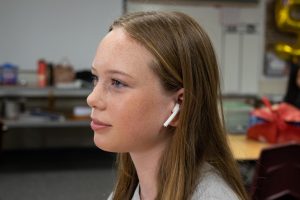AR: Notoriously Beneficial

While some students may see reading as a waste of time, it can benefit your education in many ways.
November 15, 2021
Throughout your student years, you are constantly being forced to read. Your parents, teachers, and even your peers remind you to open up a book.
Accelerated Reader is commonly known as AR. It is a digital program at Day Creek Intermediate that monitors student reading. Points reflect ability, and grow as students finish books and complete a test. When students meet goals, incentives are given.
The program attempts to encourage students to read, and parties and prizes are involved once they’ve read ‘enough’ books. However, A.R. has gained notoriety from past and present students.
“[My teacher] asks us to read a book a month and take a test at the end of the month. Then those grades go into the grade book. I don’t read a lot, so the pressure to read a book is high,” said 7th grader, Kelly C.
Reading is required across the campus. Despite all of the incentives, the bottom line is your grade.
“If you want good grades, you genuinely don’t have a choice but to read. Since if you don’t read a book, you’re going to get a zero,” said Prisha V.
While this paints an ugly picture, most kids and teachers who read speak positively about AR.
“Some students [really enjoy] the program. Some are in Book Club or Battle of the Books (BOB). I have to [stop students from reading sometimes]. I also have a lot that ask to read in their free time,” said 6th-grade teacher, Mrs. Learmont.
Due to the number of incentives inside the program, students are constantly reading to receive an invitation to parties. Even teachers work, encouraging students to meet their AR goals.
“Some don’t like reading [at all]. I try to find something for the kids to read; I get to know the student and what they like,” Learmont said.
“My homeroom teacher, Mr. Gossage, actively has us participating in the reading program. He constantly encourages us to read and even reads books with us,” Prisha said enthusiastically.
With reading being a defining factor in learning, AR has proven beneficial to a student’s comprehension and reading skills.
According to a recent study by New York University, reading is essential for critical thinking, vocabulary and comprehension. Each of these are generally agreed to be important for academic growth.
By reading regularly, students have been shown to achieve higher scores on diagnostic tests like the iReady or the CAASPP state testing, which provides ongoing validation of hard work.
Dr. Seuss once said, “The more you read, the more things you will know. The more that you learn, the more places you’ll go.” Through AR and other methods of encouraging and rewarding reading, a student is far more likely to academically thrive.





